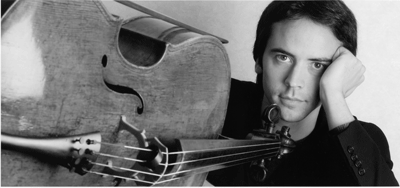![]() Criticism
Criticism
![]() Criticism
Criticism
Young duo remarkable with sonatas
Already distinguished performers
Jean-Guihen Queyras, Alexandre Tharaud elegant in VRS debut
by David Gordon Duke
Vancouver Recital Society
Jean-Guihen Queyras, cello
Alexandre Tharaud, piano
Vancouver Playhouse, Nov. 21

Cellist Jean-Guihen Queyras displayed a silky, focused yet sweet tone with beautifully graduated dynamics
The Vancouver Recital Society has sponsored the local debuts of any number of young artists who’ve gone on to major careers. From the evidence displayed in a programme of music from Vienna and Paris on Sunday evening, the cello/piano duo of Jean-Guihen Queyras and Alexandre Tharaud is likely the next to join that select cohort; these young men may be new to Vancouver, but they are already distinguished players.
Elegance is the duo’s keyword. Queyras’s tone is silky, focussed yet sweet, not particularly large but with beautifully graduated dynamics. Tharaud is cool and ultra-refined, feigning, possibly, a certain detachment, but wonderfully responsive to nuances.
Their programme began with two adapted sonatas of Schubert, the D 384 Sonata in D major (D 384, originally for piano and violin) and the “Arpeggione” Sonata (D 821). D. 384, a classical accompanied piano sonata, was transparent and playfully sparkling. The Arpeggione, written just seven years later, was profoundly different. The duo’s finesse and elegance remained, but there was an awareness of the more mature work’s broader scope. This was no run-of-the-mill reading: Queyras and Tharaud brought out levels of meaning and depths of feeling that made the sonata seem, for once, a worthy companion of the great Schubert chamber works.
In the second half, Alban Berg’s Four Pieces, Op.5 continued the recital’s sub-theme of adaptations, delving into even deeper and darker materials. Hearing Berg’s enigmatic pieces on cello rather than clarinet was almost disorienting. The warmth of the string instrument made Berg’s links with the late Romantic tradition explicit; the cello’s great range of colour added new intensity to these already painfully expressive pieces.
Francis Poulenc’s 1948 duo Sonata was the culmination of the programme. Though the duo were ever aware of Poulenc’s sophisticated, sometimes brittle wit, they also brought out his darker ironies and undertones of malice. In the hands of lesser performers the Poulenc can sound patchy and episodic. Here everything was integrated: the exquisite lux of the Cavatine, the swagger of the Ballabile, the theatricality of the finale, and the overall underpinning of classicism re-defined—all in meticulous balance.
Encores rarely add to a programme. But returning to Schubert with a transcription of Nacht und Traum (D. 827) explicitly demonstrated the broad arc of a particularly well-considered recital, a rewarding first meeting with a remarkable young duo.
Vancouver Sun
23 November 2005
 archives
archives